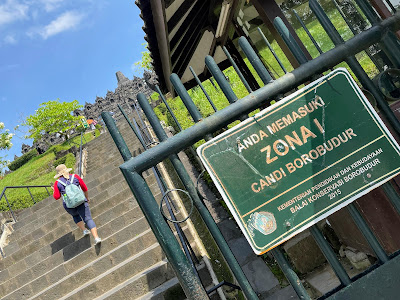Former Government Minister Faces Prison for Allegedly Insulting Buddhism
Entrance to the Borobudur Buddhist temple, built in the 9th century on Java Island, Indonesia. ©2022 Andreas Harsono/Human Rights Watch
Andreas Harsono
Indonesia Researcher
Indonesia’s toxic blasphemy law has claimed another victim, this time a former government minister over a social media post deemed insulting to Buddhists.
The latest case started in June after the Indonesian government announced it would steeply increase the entry fee for the Borobudur temple in central Java. The Buddhist structure is one of Indonesia’s major tourist attractions, drawing more than four million visitors in 2019. Conservationists and government officials are increasingly worried about the number of visitors and see raising the entry fee as a way to limit the total.
On June 10, Roy Suryo, a former minister of youth and sports affairs, tweeted the picture of a Borobudur stupa whose image had been photoshopped to resemble President Joko Widodo. He received protests, including from Buddhist organizations, and soon deleted the tweet, apologizing and saying that he did not create the altered picture.
Kevin Wu, a leader of Dharmapala Nusantara, a Buddhist group in Jakarta, reported Suryo to the police for committing blasphemy against Buddhism. Jakarta police questioned Suryo three times and then charged him with violating the blasphemy law and the internet law. Police arrested him on August 5. If convicted, Suryo faces punishment of up to 11 years in prison.
The blasphemy law punishes deviations from the central tenets of Indonesia’s six officially recognized religions – Islam, Protestantism, Catholicism, Hinduism, Buddhism, and Confucianism – with up to five years in prison. It was only used in eight cases in its first four decades after President Soekarno signed it in 1965 but convictions spiked during the decade when President Susilo Bambang Yudhoyono, Roy Suryo’s boss, was in power from 2004 to 2014. President Widodo’s administration is drafting a new criminal code with a plan to keep the blasphemy law, albeit with the disturbing proviso of expanding the law to cover beliefs as well as religions.
Ironically, Roy Suryo has also used the blasphemy law against his political opponents. In February 2022, he filed a police report against Religious Affairs Minister Yaqut Cholil Qoumas for blasphemy, claiming Yaqut’s comparison of noisy mosques to barking dogs was an insult to Islam.
Roy Suryo’s arrest shows again that the blasphemy law is destructive and prone to misuse because it enables the “protection” of religion to be weaponized as a political tool. The Widodo administration should learn from these ugly cases and revoke the blasphemy law provisions.
